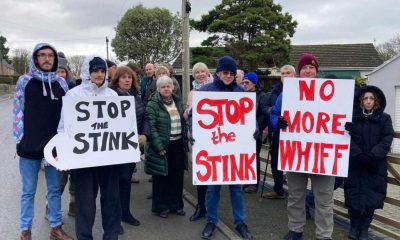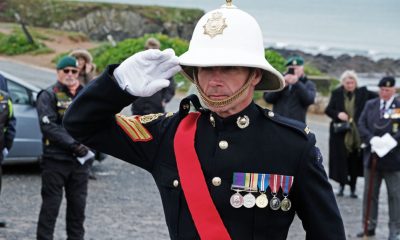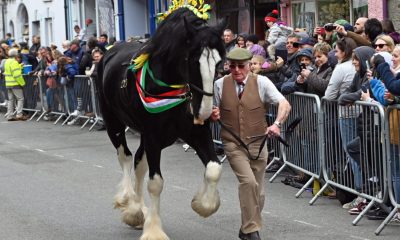News
Storm costs in excess of £750k
 AT PEMBROKESHIRE COUNTY COUNCIL’S Overview and Scrutiny Committee meeting on Thursday, March 13, Councillors discussed the costs of the recent storms.
AT PEMBROKESHIRE COUNTY COUNCIL’S Overview and Scrutiny Committee meeting on Thursday, March 13, Councillors discussed the costs of the recent storms.
A report from the Head of Highways and Construction, Darren Thomas, and the Head of Environment and Civil contingencies, Richard Brown, outlined that the costs of the recent storms would be in excess of £750,000.
The report showed damage to the roads in Amroth and Wisemans Bridge, the flooding on Black Bridge and Carew Bridge and in the Pembroke Commons. Darren Thomas added that they hoped to complete work on the road in Amroth by the end of June.
They also showed the flooding in Newgale, Dale and Haverfordwest.Pictures showing the effects of the high winds that caused chaos in the middle of February were also on the presentation. They added that there were over 200 updates on Facebook and over 600 on Twitter in what was a busy period for the council.
Nearly 600,000 people viewed the Facebook posts while the photo of the bus incident in Newgale was seen by 25,000 people.
Regarding the situation at Newgale, Darren Thomas said: “The shingle bank collapsed and the road remained closed for five to six days. Some people have said that we should have gone in after the first day but trying to get there in the conditions would have been extremely difficult”.
Richard Brown added: “The Newgale diversion caused a lot of problems. There were major implications for the people who were flooded”.
The report concluded by showing the issues and challenges faced by the council during these periods.
One of the main issues was that of members of public ignoring safety messages, road closures and travelling advice.
The report highlighted a number of facts from another report made by Environment Agency which said: “A third of flood related deaths involve a vehicle because drivers take unnecessary risks”.
Darren Thomas said: “If drivers ignore a road closed sign then their insurance is invalid”.
Many workers faced abnormal shift patterns and councillors were keen to express their thanks to those who braved the elements as they worked round the clock to clean the roads. Councillors were then given the chance to discuss the report.
Cllr David Bryan asked: “Whose responsibility is it to put sand bags out?” to which Richard Brown replied: “The people are responsible for sand bagging but we will assist if we can”.
Councillors also asked about the amount of trees that came down during the strong winds to which Richard Brown answered: “It is in their own interest to make sure trees are safe and not going to damage infrastructure.
Darren Thomas added: “There will be a highways inspection and if we find a tree in a dangerous position we will notify the land owner”.
Both Darren and Richard concluded that the council had learnt a number of lessons including the use of social media and highways management issues.
News
Welsh Lib Dems urge First Minister to return dodgy donation

THIS week in the Senedd, the Welsh Liberal Democrats have urged the First Minister to return the £200,000 donation he received from a company linked to environmental crimes.
Speaking to the Senedd on Wednesday, party leader Jane Dodds MS urged FM Vaughan Gething to return money donated to his campaign by Dauson Environmental, a refuse and recycling business owned by David John Neal.
Mr Neal received a 3-month suspended prison sentence in 2013 for illegally dumping waste at a conservation site on the Gwent levels.
His companies Atlantic Recycling and Neal Soil Suppliers were also prosecuted and given fines and costs of £202,000.
Then in 2017, Mr Neal was given another suspended sentence of 18 weeks, with fines and costs of £230,000 after failing to remove the waste.
The Welsh Lib Dems have called on the FM to return the donation, as part of wider calls for a shift away from the influence of “big money” in Welsh politics.
Commenting, the Leader of the Welsh Liberal Democrats Jane Dodds MS said:
“This entire episode has casted a dark shadow upon Welsh democracy and has rightfully led to many questioning the integrity of Vaughan Gething’s leadership campaign and the way our democracy works here in Wales.
Unfortunately for many of us this is hardly surprising, as our political system has been broken for quite some time now.
A system that empowers the elite donor class whilst simultaneously shutting out the voice of the voter is a perversion of democracy itself.
This is why our wider goal must be to remove the influence of ‘big money’ from Welsh politics once and for all.
We cannot have another government that prioritises the interests of its financial benefactors over those of the Welsh people.
We need to take a firm stance in rooting out the influence of cash in Welsh politics, for the sake of our communities we must start prioritising their interests and needs instead of having more self-serving politicians.”
News
Council seeking legal advice to address Withyhedge enforcement
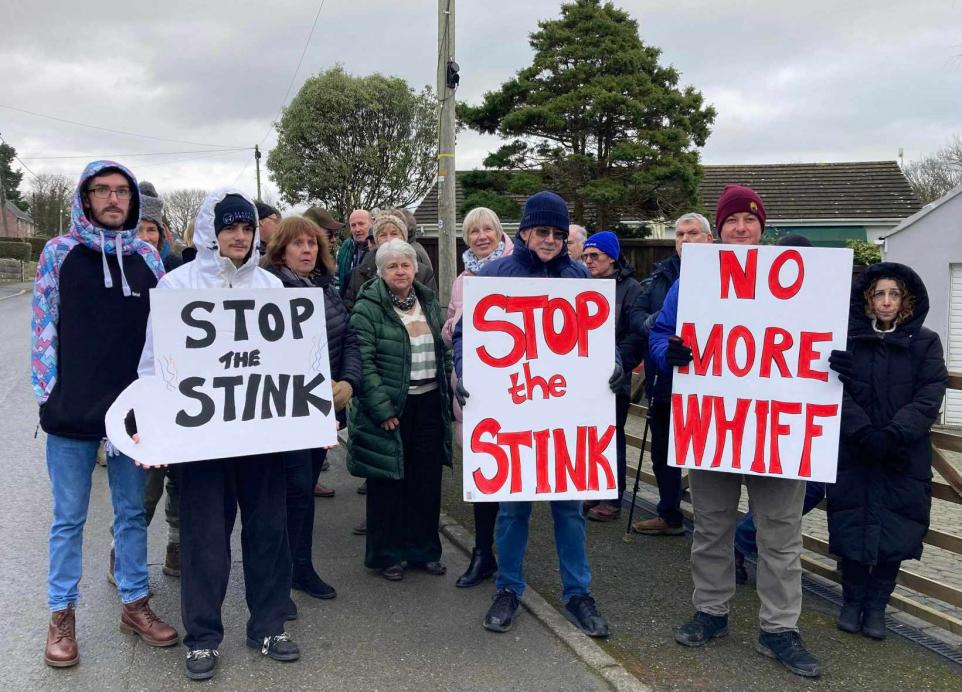
PEMBROKESHIRE County Council says it has sought legal advice and is contemplating legal proceedings against Withyhedge Landfill operators RML, in regards to the ongoing odour issues at the site.
The Council intends to ask the Court for an injunction requiring RML to abate the public nuisance odour arising from the landfill. Failure to comply with the injunction would be contempt of court, which carries a penalty of up to two years’ imprisonment and unlimited fine.
Following significant work undertaken by RML the Authority is disappointed that the problem has not been resolved and residents continue to be impacted by the odour.
Working in collaboration with Natural Resources Wales (NRW) and Public Health Wales (PHW), we fully appreciate that the communities affected cannot tolerate this any longer.
NRW announced that the first set of deadlines for the completion of actions to tackle the ongoing odour issues at Withyhedge Landfill have been met, one week on following the issuing of further enforcement action on 18th April.
This will be closely monitored by NRW to ensure the operator complies with all the actions set out in Notice by 14 May.
It was deemed appropriate to wait until the operator had carried out mitigation to comply with the enforcement requirements by NRW prior to considering this additional action.
To that end, on 26th April 2024, the Council served RML with a letter of claim and invited them to give legally binding undertakings to abate the odour nuisance or face legal proceedings. The Council also asked for disclosure of documents relevant to the proceedings, including records of waste brought in or removed from the landfill.
The Council has given RML until 14th May 2024 to respond to its letter of claim. This aligns with the current deadline set by NRW under its enforcement notice.
Pembrokeshire County Council Chief Executive Will Bramble welcomed the move. He said: “We are extremely disappointed that RML has not delivered the necessary action to stop the completely unacceptable smells from the site.
“We fully support the additional enforcement action being taken by NRW and continue to work closely with them to do all in our power to correct the situation.
“Our intention to ask the Court for an injunction requiring RML to stop the odour nuisance arising from the landfill, is another part of our collaborative approach. The smell from Withyhedge is having a major impact on residents and visitors. This situation has gone on too long and it is unacceptable.”
News
Beautiful, funny and lovely: Family pay tribute to Sian Batchelor

THE family of a woman has paid tribute to a “beautiful, funny, lovely person.”
Sian Batchelor, aged 32, was found on a beach near Pennar, Pembroke Dock on Tuesday evening, April 30th, 2024.
Her family has issued a statement to say: ‘We are devastated by our loss. Sian was a beautiful, funny, loving person. We will treasure the good times we had with her.
“We would now like time to grieve and would ask to be given privacy in which to do so.”
The circumstances surrounding Sian’s death are being investigated and police would like to hear from anyone with information, sightings of Sian or contact from Sian, between Thursday April 25 to Tuesday April 30.
Police can be contacted either online at: https://bit.ly/DPPContactOnline, by emailing [email protected], or by calling 101. If you are deaf, hard of hearing, or speech impaired text the non-emergency number on 07811 311 908.
Quote reference: DP-20240430-284
-

 News2 days ago
News2 days agoPolice investigating after woman found dead on beach near Pennar
-

 News2 days ago
News2 days agoPolice discover body in search for Luke Stephenson, 19
-

 News2 days ago
News2 days agoCouncillors block Milford Haven boxing event – promoter to appeal
-

 Crime3 days ago
Crime3 days agoLlandissilio man accused of making hundreds of child abuse images
-

 Business6 days ago
Business6 days agoLargest Welsh port appoints communications and marketing director
-

 Business3 days ago
Business3 days agoLidl GB eyes Pembroke Dock for new larger supermarket
-

 News13 hours ago
News13 hours agoBeautiful, funny and lovely: Family pay tribute to Sian Batchelor
-
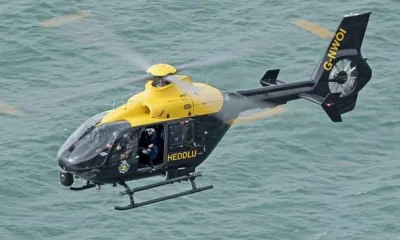
 News2 days ago
News2 days agoSearch efforts continue for missing teenager Luke Stephenson












